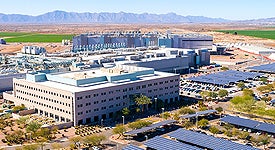The purpose of the City of Chandler's Industrial Pretreatment Program (IPP) is to protect the Publicly Owned Treatment Works (POTW) – the sanitary sewer system that conveys and the treatment plants that receive wastewater – from pollutants that may cause harm or interfere with the operation of the POTW, and to protect the health and safety of the public and the environment. The program accomplishes this by implementing and enforcing Federal Categorical Standards, State Regulations, and limits developed locally authorized by the Clean Water Act. Ordinance No. 4503 under Chandler City Code Ch. 51-24 formally adopted the City of Chandler’s Wastewater Pretreatment Program on Nov. 4, 2013.
The main components of the IPP include:
- Development of technically based local limits; these discharge limits are developed based on the concentration of pollutant that can be effectively removed by treatment processes and the discharge limits imposed upon the plants through permits issued by the state;
- Issuance of Industrial User Permits and implementation of Best Management Practices to remove pollutants form industrial wastewater;
- Industrial and commercial facility inspection;
- Sample collection to ensure compliance with discharge limits and other applicable regulations; and
- Enforcement.
The IPP is committed to controlling the pollutants discharged to the POTW from non-domestic sources – all non-residential users, i.e., Industrial Users (IUs) – within the City boundaries or connected to a POTW owned or managed by the City.
A few of the specific objectives the IPP must achieve:
- To prevent the introduction of pollutants into POTW, which will cause an interference1 with the operations of the POTW, including its ability to use or disposal of municipal sludge;
- To prevent the introduction of pollutants into POTW, which will pass-through2 the treatment works or otherwise be incompatible with such works;
- Provide protection with regard to the health and safety of the public and the environment;
- Provide protection of the structure and integrity of the collection system and safety for the POTW personnel;
- To prevent deterioration of the quality standards of the receiving waters – the quality of water discharged to the aquifer;
- To prevent contamination and maintain the quality of the POTW sludge – which is a byproduct of the treatment process that must be disposed via landfilling and can be used beneficially, such as for composting; thus, preserving the safe disposal and any future uses of the POTW sludge;
- To improve opportunities to recycle and reclaim municipal and industrial wastewaters.
1 Interference: A discharge by an Industrial User (non-residential source), which inhibits or disrupts the treatment plant processes or operations.
2 Pass-Through: The discharge of pollutants through the treatment plant, which causes a violation of any requirement, regulation, or standard governing the treatment plant.
The IPP is tasked with these additional responsibilities,
- Inspecting all devices that remove fats, oils, and grease (FOG) such as grease interceptors, grease traps, etc. at any commercial facility and food service establishment.
- Fats, oils, and grease (FOG) of vegetable origin or petroleum substances, whether emulsified or not, in excess of 100 mg/L must not be discharged to the POTW.
- Wastewater with a pH less than 5.0 SU, or greater than 12.5 SU or demonstrating any other corrosive property must not be introduced into the POTW.
- Assessing excess pollutant fees in accordance with the Section II.C of the City of Chandler’s Wastewater Pretreatment Program; surcharge fees are assess for the following:
- Wastewater with pollutants demonstrating a biochemical oxygen demand (BOD) in excess of 300 mg/L,
- Wastewater with a level of total suspend solids (TSS) in excess of 350 mg/L, and
- Wastewater containing ammonia concentrations in excess of 35.0 mg/L.
Pretreatment fees are authorized by Chandler City Code Ch. 50-13.



